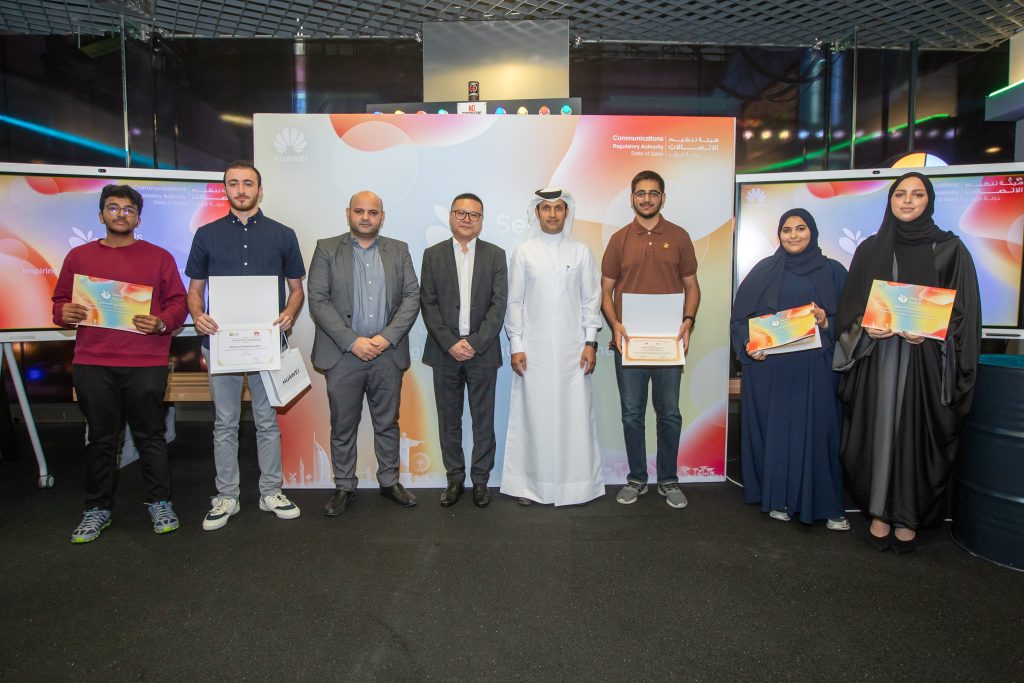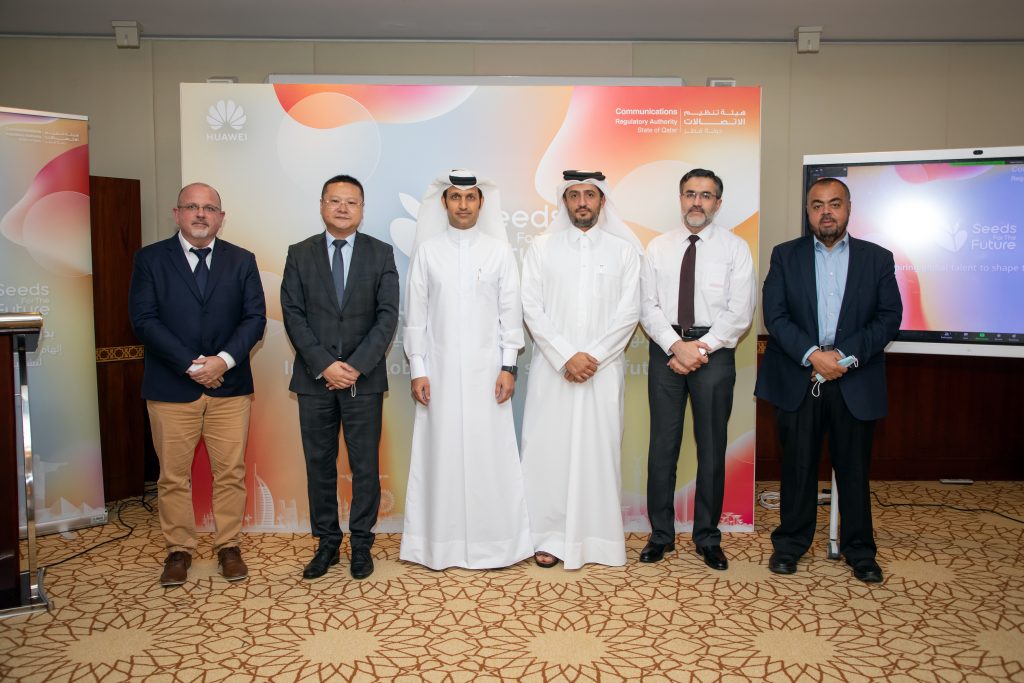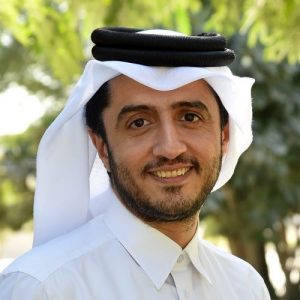Home » Achievements (Page 9)
Category Archives: Achievements
Recent Posts
- Strengthening Industry Collaboration: CSE Hosts IAB Meeting for CS and CE Programs
- CSE Students Secure First Place at Snoonu Hackathon 2026
- CSE Faculties Receive Grants on Institutional Collaboration between Qatar University & Khalifa University
- Computer Engineering Practicum Demo Day & Contest (4th Edition)
- CSE faculty receives research funding from Google
Archives
- January 2026
- December 2025
- November 2025
- September 2025
- August 2025
- May 2025
- February 2025
- January 2025
- December 2024
- November 2024
- September 2024
- June 2024
- May 2024
- April 2024
- March 2024
- February 2024
- January 2024
- December 2023
- November 2023
- October 2023
- September 2023
- June 2023
- May 2023
- April 2023
- March 2023
- February 2023
- January 2023
- December 2022
- November 2022
- October 2022
- September 2022
- August 2022
- May 2022
- April 2022
- March 2022
- February 2022
- January 2022
- December 2021
- November 2021
- October 2021
- September 2021
- August 2021
- July 2021
- May 2021
- April 2021
- March 2021
- February 2021
- January 2021
- December 2020
- November 2020
- October 2020
- September 2020
- August 2020
Categories
CSE Students Participate in Huawei’s “Seeds for the Future” Program
September 6, 2022 / Leave a comment

Under the endorsement of Qatar Communication Regulatory Authority and Ministry of Communications and Information Technology, Huawei Technologies organized its “Seeds for the Future” program over 8-day online training from 29 August to 5 September 2022. The program targeted Qatar elite university students to obtain valuable cutting-edge ICT knowledge developed by Huawei and promote creativity amongst students by acting as a bridge between the classroom and the industry enhancing students’ future opportunities. The program offered a rich experience involving technology courses including 5G, cloud computing, AI, IoT, leadership course, and participation in “Tech4Good” group project.
This year, 24 students from QU, HBKU, UDST, and CCQ have participated in the Huawei SFTF program. We are proud that QU-CSE students Sara Metwaly and Rufus John Kurian got awarded QU Best Performance and Daily Proactive Student awards respectively.
Big congratulations to our wining students and wishing them the bright future in their study and beyond!


CSE Faculty Receives QU 2021-2022 Outstanding Faculty Service Award
August 15, 2022 / Leave a comment

Dr. Noora Fetais
Our faculty member, Dr. Noora Fetais, was awarded the Qatar University Outstanding Faculty Service award for AY 2021-2022. The award is established to honor and recognize faculty members who have demonstrated excellence in service to QU and the community at large.
The faculty service is a cornerstone of faculty duties at QU and represents one of the pillars of QU strategic plan. The type and scope of university services is clearly defined in QU Mission and Key Performance areas, where the university has pledged to address relevant local and regional challenges, advance knowledge, and contribute actively to the needs and aspirations of society. Recognizing the importance of outstanding faculty services and its significance in meeting the University’s mission, the Office of the Vice President for Academic Affairs instituted Qatar University Outstanding Faculty Service Award. Congratulations Dr. Noora for the award!
CSE Faculty Awarded NPRP-C Grant from QNRF
August 15, 2022 / Leave a comment
A major cluster grant titled “The Future of Digital Citizenship in Qatar: A Socio-Technical Approach” from the Qatar National Research Fund (QRNF) was awarded to HBKU, Qatar University, and many other partners to lead a multi-entity, interdisciplinary project on digital citizenship in the Arab region.
The $3.8m four-year grant was awarded under QRNF’s National Priorities Research Program-Cluster (NPRP-C) and enables collaboration between 10 entities from academia and industry.

Dr. Raian Ali, Professor in Information and Computing Technology at HBKU, will lead the cluster as program director with six projects that will focus on building an observatory for trends and common topics on social media, web-based tools, educational materials, and research into digital literacy and well-being, gender equity, social inclusion, behavior-based approaches to security and safety, detecting and limiting propaganda and other areas.
Qatar University is leading two projects by Dr. Khaled Khan and Dr. Osama Halabi from the Computer Science and Engineering Department, College of Engineering.
The project led by Dr. Khaled Khan is titled ”Security and Safety as a Behavior”. It is a collaborative project between Qatar University, HBKU, and Bournemouth University. The project will research a behavior-based approach to security and safety. Investigate hacking and social engineering techniques that are successful in the Arab world and propose socio-technical approaches to enhance resilience to manipulators online and encourage reporting. The solutions are based on the approaches of behavior rehearsal, simulation, and social norms.
The project is led by Dr. Osama Halabi is titled “GESI by Design”. It is a collaborative project between Qatar University and HBKU. The project will study how to mitigate issues related to Gender Equality and Social Inclusion (GESI) in social media in Qatar and the Arab world and increase awareness of them. The team will use digital nudging techniques based on annotation and a bespoke set of reactions and emojis and devise tools to facilitate a structured dialogue. The aim is to encourage a more civilized and inclusive language and interaction.
The cluster is supported by a wide range of key stakeholders in Qatar including the Ministry of Communication and Information Technology, Qatar National Library, Msheireb Museums, Qatar Finance Centre, and Fadaat Media, who will provide facilities and enrich the knowledge transfer.
Announcement of CSE Senior Project Contest AY21-22 Winners
May 27, 2022 / Leave a comment
The winners of our department’s senior project contest for 2021-2022 academic year have just been announced. A showcase of spectacular SDP projects took place on May 10, 2022 at QU. The event included live demos and posters’ presentations. Internal examiners and judges from industry evaluated the projects.
Computer Science Winners
- First Place: Yousseif Elshahawy, Mohanad Mohamed, and Hesham Zaky, with a project titled “Harassment Heat-Map“. Supervisor is Dr. Mohamad Saleh.
- Second Place: Dana Hasan, Maryam Al-Malki, and Maryam Arab, with a project titled “Sakkin: Taking Real Estate To The Next Level“. Supervisor is Dr. Sayed ElSayed.
- Third Place: Fatma Al-Mansouri, Shaymaa Al-Mohssen, Fatima Al-Khulaifi, and Muneera Al-Naimi, with a project titled “Share“. Supervisor is Dr. Khalid Khan.
Computer Engineering Winners
- First Place: Muraam Abdel-Ghani, Hoda Helmy, and Somaya Eltanbouly, with a project titled “Assistive Telexistence System Using Motion Blending“. Supervisor is Dr. Osama Halabi, co-supervisor is Dr. Mohammed Al-Sada .
- Second Place: Mohamad Bahri, Abdelrahman Soliman, Mohamed Daniel Bin, and Mohamad Izham, with a project titled “AirEye: UAV-Based Intelligent DRL Mobile Target Visitation“. Supervisor is Dr. Amr Mohamed.
- Third Place: Aya Elsayed, Sofia Basha, and Myesha Hoque, with a project titled: “Automatic Electronic Gate System Using BLE Beacons of EHTERAZ“. Supervisor is Dr. Qutaibah Malluhi .
Well done CSE SDP teams; everyone is a winner indeed!
Huawei Opens AI Lab at Qatar University
May 11, 2022 / Leave a comment

Qatar University (QU) has partnered with Huawei to open an AI Lab as part of the Huawei ICT Academy at the university. The collaboration is a further boost to Qatar’s economy, whose National Vision 2030 recognizes talent’s central role in forging a prosperous society.
The Lab was officially opened by Dr. Khalid Al Ali who delivered a keynote speech, as well as Dr. Khalid Naji, Dean of the College of Engineering, QU, and Liam Zhao, CEO, Huawei Gulf North, in the presence of other senior Huawei executives, dignitaries and faculty. The group later toured the state-of-the-art lab equipped with the latest technologies.
The Huawei ICT Academy Lab will train QU students using Huawei equipment to acquire high-level Huawei Certifications in a real environment. It will also support university research programs, provide cutting-edge technology and platforms, and inspire innovation by conducting industry and university collaborative projects and research.
Dr. Khalid Al Ali, assistant undersecretary for higher education in the Ministry of Education and Higher Education said, “We are highly encouraged to see our universities and the private sector coming together to advance education. We recognize that the public sector alone would struggle to meet the talent demand of the digital economy. But forging such partnerships elevate the skillsets of our youth and, in turn, helps build a competitive economy that can respond faster to market demand and global trends.”
Dr. Khalid Naji, Dean of the College of Engineering at QU, said, “As our country’s leading university, we are at the forefront of Qatar’s efforts to develop a highly-skilled labor force. Partnering with Huawei exposes our students to the latest advances in ICT while equipping them with real-world skills that meet the demands of a digital economy. We will continue to explore further areas of cooperation as demand for digital skills accelerates.”
Liam Zhao, CEO of Huawei Gulf North, said, “Huawei has a long-term and mutually beneficial relationship with the State of Qatar and various public and private organizations. The opening of the AI Lab deepens this relationship while helping the country deepen its ICT talent ecosystem. We are confident the ICT Academy and the AI Lab will make a significant contribution in enabling the country to attain its objectives.”
As a leading global ICT solution provider, Huawei advocates for an open, shared ICT talent ecosystem that benefits all parties. Over the past nine years, Huawei has built a talent supply chain covering the entire learning, certification, and employment process by deepening the cooperation mechanism between universities and enterprises, promoting industry development, and innovating talent development models based on enterprise requirements.
CSE Faculty Awarded 2 NPRP-S Grants from QNRF
April 14, 2022 / Leave a comment
Our CSE department was awarded 2 National Priorities Research Project-Standard (NPRP-S) grants from Qatar National Research Fund (QNRF) in their 14th cycle. This cycle was so competitive that Qatar University was awarded only 14 projects; 5 of which are awarded to the College of Engineering. The two awarded projects are led by Dr. Tamer Elsayed and Dr. Abdulla Al-Ali.

The project led by Dr. Abdulla Al-Ali is titled “Defense Against Hardware Intrinsic Attacks in Resource-Constrained COTS based Traditional and Futuristic Artificial Intelligence of Things (AIoT).” It is a collaborative grant between QU and Tennessee Tech University in collaboration with the Ministry of Interior, Qatar. The PIs from QU are Dr. Abdelkarim Erradi and Dr. Uvais Qidwai, while the Tennessee Tech University PIs are Dr. Syed Rafay Hasan, Dr. Tarek Elfouly and Dr. Terry Guo. The project revolves around three main objects: (a) The development of hardware intrinsic security mechanisms for Resource Constrained (RC) Commercial off the shelf (COTS) based traditional IoT systems, (b) Investigating the vulnerability of hardware intrinsic security mechanisms for RC-COTS based futuristic AIoT system, and (c) developing a testbed implementation to examine real world scenarios to make the proposed work technology ready.

The project led by Dr. Tamer Elsayed is titled “Dimension-Specific Automated Scoring of Arabic Language Writing Proficiency“. The project’s team is entirely based in Qatar, having Dr. Houda Bouamor from CMU-Q and Dr. Walid Massoud from QU, with complementary expertise in Arabic natural language processing, information retrieval, applied machine learning, and psychometrics and standardized testing. The goal of the project is to build an automated scoring system for the quality of students’ writing abilities (on different aspects) in standard Arabic exams (similar to IELTS or TOEFL English exams). The proposed system, which is potentially the first of its kind in the Arab region, will potentially help in assessing the students’ writing proficiency in Arabic exams offered at QU as well as several high schools at Qatar Foundation. The project is funded for 3 years.
